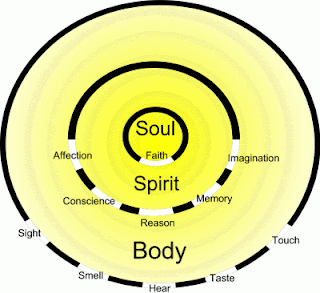"So, so you think you can tell Heaven from Hell,
blue skies from pain.
Can you tell a green field from a cold steel rail?
A smile from a veil?
Do you think you can tell?"
On the surface of things, talking about the “mysteries” of Heaven and Hell may seem as silly as Pink Floyd’s rhetorical questions. After all, our doctrines of Heaven and Hell are rather well established. However it is not these well established doctrines that I wish to discuss here. What would be the point after all? Among Christians there cannot really be a debate about the existence of Heaven or Hell as their reality was firmly established by Jesus Himself. Furthermore, I doubt I could add anything fresh to a discussion of what they are like. If you truly are interested in the various theories regarding the nature of Heaven or Hell I suggest you crack open a Systematic Theology textbook. Instead, I thought I would discuss something about the existence of Heaven and Hell that we don’t often talk about in Church – the fact that God didn’t really bother telling people about it for a couple of millennia.
Early Judaism had no concept of the afterlife the way we do in modern Christianity. Heaven was at best somewhere “above”, a place where God and His angels resided. With regards to Hell, there is a reason you don’t find it often (and not at all in the NIV) in the Old Testament and that is that the Hebrew word for Hell – Sheol – is usually translated “grave” instead of “Hell”. For the ancient Jews, Sheol was not a place of torment for the wicked but rather a place where the souls of all dead people went. Hell was used much in the same sense as death – “You saved me from hell and the pit” more or less translates to “You saved my life”. Much like the Greek Hades, hell was really just the land of the dead. However, that is where the similarities to other cultures end because the thing that really set the ancient Israelites apart from most other nation is the fact that they paid very little mind to the afterlife. They were the polar opposites of their next door neighbors Egypt. There, the afterlife was more important than life itself and the Pharaohs devoted most of the country’s wealth and resources to secure the best possible position in the afterlife. Not so with the Israelites. As far as we can tell they had no philosophy or myth regarding the afterlife (like the Greeks did). They certainly had no Theology regarding it – there is no discussion of the afterlife in the Torah whatsoever. Those who claimed to be in touch with the afterlife – mediums and witches for instance – were not allowed in the land on pain of death. It seems fair to assume that they thought no good could come from thinking about the afterlife, in fact it seems like they fully expected that only evil would come of it.
By having no focus on the hereafter, the Israelites were very firmly rooted in the here and now and nowhere is this expressed clearer than in the Psalms. There you will often find sentiments expressed along the lines of, “I have been faithful, bless me now!” or “He is wicked, make him suffer and then kill him!” Clearly they had no concept of rewards or justice being handed out after death, instead they fully expected it in the here and now. To them this life was all you had and death was the end. You know what’s really weird about this? God was apparently OK with all that!
See, if you had spent any time with Christians whatsoever, this is the very last thing you would expect God to accept. After all, to the Christian mind Heaven and (especially) Hell really is the point of everything we do. Repentance? So that you don’t go to Hell. Salvation? Getting saved from Hell. Jesus? Came to save us from Hell. Holiness? Because sin might cause us to go to Hell. Obedience to God? So that we may be rewarded in Heaven. And so then our entire faith becomes about making it to Heaven and not going to Hell. It certainly forms the core of all things evangelism related. Just last week I got a DVD in my mailbox entitled “23 minutes in eternity” – it was the testimony of a man who allegedly spent 23 minutes in Hell and a local church was handing out copies as some form of evangelical outreach. Evangelism has become synonymous with convincing people they are going to go to Hell and then offering them a way out of it. Thousands of tracts are distributed daily all with this very message. The entire Gospel message has been reduced to “turn or burn”. Frankly, if you have ever been within earshot of any kind of evangelistic outreach you would probably have gotten the message that God’s number one care in life is Hell.
everything we do. Repentance? So that you don’t go to Hell. Salvation? Getting saved from Hell. Jesus? Came to save us from Hell. Holiness? Because sin might cause us to go to Hell. Obedience to God? So that we may be rewarded in Heaven. And so then our entire faith becomes about making it to Heaven and not going to Hell. It certainly forms the core of all things evangelism related. Just last week I got a DVD in my mailbox entitled “23 minutes in eternity” – it was the testimony of a man who allegedly spent 23 minutes in Hell and a local church was handing out copies as some form of evangelical outreach. Evangelism has become synonymous with convincing people they are going to go to Hell and then offering them a way out of it. Thousands of tracts are distributed daily all with this very message. The entire Gospel message has been reduced to “turn or burn”. Frankly, if you have ever been within earshot of any kind of evangelistic outreach you would probably have gotten the message that God’s number one care in life is Hell.
But if that is true, why didn’t He bother telling anyone about it for so long? If the most important message that anyone can hear is that they are in fact hellbound – despite their good deeds – why did God not say it? Not from Mt Sinai, not through the Law or the judges or the kings or the prophets, not once. If we need to be constantly reminded that souls are being lost every day – via forwarded emails, sermons, tracts and films – due to our inaction, why was God Himself so inactive on the subject for so long?
Again, I’m not in the least bit trying to argue against the existence of Heaven and Hell. Jesus spoke about it at length after all, He left no doubts. What I am asking is why, if it is so incredibly important that every soul must know about Hell, did God not bother telling anyone about it for so long? And another thing – if it really forms the core of evangelistic outreach, why didn’t the New Testament evangelists (who certainly knew about Hell) use it? John the Baptist preached repentance but not in order to avoid hell but to welcome the Kingdom. Jesus discussed hell and final punishment often and yet His message was always that the Kingdom of God was at hand. When He sent out the disciples to preach, the message was again a Kingdom one, not a fire and brimstone one. In fact, in the sermons of the Apostles, from Peter to Paul you never seem to hear them say anything like “turn or burn”. They didn’t present people with Hellfire, they presented them with Jesus.
So if no one in the Bible ever converted the unsaved by first convincing them they were hell-bound, why is that standard operating procedure now? I get that it’s easier that way. In fact I recently saw a piece of a “Way of the Master” video by Kirk Cameron and Ray Comfort where they explicitly explained that the best way to reach someone is not to reason with them but rather to “bypass their intelligence and go straight for the heart” – which turned out to mean, scare them with damnation and they will want to be saved. Just because it’s easier, does that make it right? Sure the “turn or burn” message is effective in soul winning but it does that in the same fashion that electoral violence and intimidation is effective at election winning. Shouldn’t it be significant to us that the New Testament church we all envy was built not on “turn or burn” but on “Have you heard about my friend Jesus”? Do we just not trust that the Holy Spirit is as powerful today as He was then? Is the easy way really the best way? Should we be choosing quantity over quality?
rather to “bypass their intelligence and go straight for the heart” – which turned out to mean, scare them with damnation and they will want to be saved. Just because it’s easier, does that make it right? Sure the “turn or burn” message is effective in soul winning but it does that in the same fashion that electoral violence and intimidation is effective at election winning. Shouldn’t it be significant to us that the New Testament church we all envy was built not on “turn or burn” but on “Have you heard about my friend Jesus”? Do we just not trust that the Holy Spirit is as powerful today as He was then? Is the easy way really the best way? Should we be choosing quantity over quality?
But I digress, the original question was about why God waited so long to tell people about the realities of the afterlife. Well obviously I can’t pretend to know but would guess that maybe God wanted it to be about Him. Only Him. Not about what we can get, not about the punishment we fear, just Him. Maybe the way God revealed things tells us that knowing about the afterlife is for the mature, not the novice. See, I believe that learning about heaven and Hell too soon can cause us to lose sight of God altogether. It can simply become about us, about us choosing the good option over the bad. When you get right down to it, it’s possible to focus on the afterlife while thinking of God only peripherally. Knowing God should be first and foremost, when Heaven becomes anything more than a continuing relationship with God and Hell becomes anything more than separation from Him to us, maybe we are in trouble. I often look at David, how he loved and worshiped God with such vigor and passion – all while believing that after death he would no longer be able to worship God – and I wonder if I could have done the same. What would our faith look like if God announced today that Heaven and Hell was off the table, this life is all there is? Would we worship the same? Would we live the same? How would we evangelize? Would we even spread the Gospel if we didn’t believe in a Heaven and a Hell? Would we still try to live a holy life? (On a side note, am I the only one who finds it creepy as hell when Christians tell unbelievers that “if there is no heaven and hell you might as well go out raping and killing people” Why is it that the fundamentalist mind always seems to go straight for rape and murder? I think it’s really disturbing. ) Honestly I can’t be sure I would answer yes to all that. This just suggests to me that my religion is not very God focused. After all, God should matter more to me than eternity should He not? We often say Christianity is not a religion, it’s a relationship. Well if it is a relationship shouldn’t we be more concerned with making the Person we are in a relationship with happy than with the rewards and punishments of it?
realities of the afterlife. Well obviously I can’t pretend to know but would guess that maybe God wanted it to be about Him. Only Him. Not about what we can get, not about the punishment we fear, just Him. Maybe the way God revealed things tells us that knowing about the afterlife is for the mature, not the novice. See, I believe that learning about heaven and Hell too soon can cause us to lose sight of God altogether. It can simply become about us, about us choosing the good option over the bad. When you get right down to it, it’s possible to focus on the afterlife while thinking of God only peripherally. Knowing God should be first and foremost, when Heaven becomes anything more than a continuing relationship with God and Hell becomes anything more than separation from Him to us, maybe we are in trouble. I often look at David, how he loved and worshiped God with such vigor and passion – all while believing that after death he would no longer be able to worship God – and I wonder if I could have done the same. What would our faith look like if God announced today that Heaven and Hell was off the table, this life is all there is? Would we worship the same? Would we live the same? How would we evangelize? Would we even spread the Gospel if we didn’t believe in a Heaven and a Hell? Would we still try to live a holy life? (On a side note, am I the only one who finds it creepy as hell when Christians tell unbelievers that “if there is no heaven and hell you might as well go out raping and killing people” Why is it that the fundamentalist mind always seems to go straight for rape and murder? I think it’s really disturbing. ) Honestly I can’t be sure I would answer yes to all that. This just suggests to me that my religion is not very God focused. After all, God should matter more to me than eternity should He not? We often say Christianity is not a religion, it’s a relationship. Well if it is a relationship shouldn’t we be more concerned with making the Person we are in a relationship with happy than with the rewards and punishments of it?
Also I think a bonus side effect of not knowing about the afterlife was that the ancient Israelites focused on the here and now. The afterlife can be dangerous in that sense after all – we can be so fixated on the “one day” that we fail to be of any use in the “right now”…























